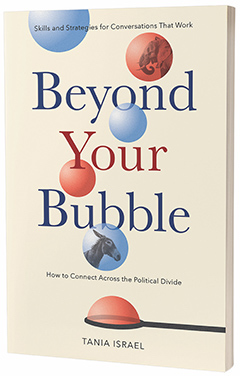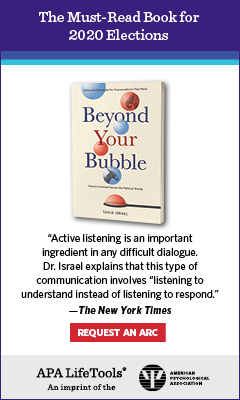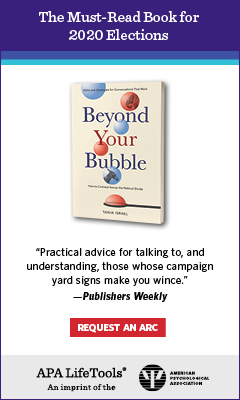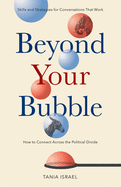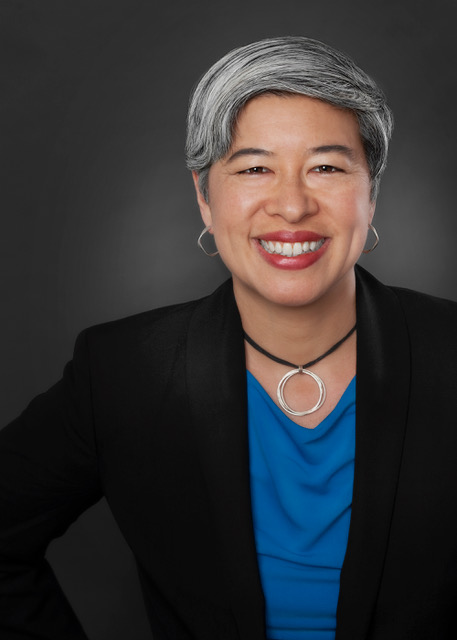Beyond Your Bubble: How to Connect Across the Political Divide: Skills and Strategies for Conversations that Work
by Tania Israel
In deeply difficult and divided times, it can be tempting to view the world in binaries. A spirit of bridging divides and finding common ground imbues Tania Israel's work. Following the 2016 election of Donald Trump, Israel designed "The Flowchart that Will Resolve All Political Conflict in Our Country." While the chart's hyperbolic title might feel tongue-in-cheek, it aims to resolve conflict by communicating and fostering understanding. Beyond Your Bubble: How to Connect Across the Political Divide: Skills and Strategies for Conversations that Work is the outgrowth of that chart--still concise, clear and cogent, essentially an instruction manual for anyone who wants to learn how to initiate and engage in productive dialogues despite political differences.
Israel begins her thoughtful communication guidebook Beyond Your Bubble by confronting this tendency toward division head-on. "We are #metoo and 'Make America great again,'" she writes. "We are gun rights and gun control. We are oil and coal and climate change. We are tearing down Confederate monuments and building walls to keep immigrants out. We are marching and shouting and weeping and cheering. We are Tweeting and sharing and liking and unfriending." Frankly, "We are in turmoil."
Oversimplification abounds. Logic and reason may seem obvious within our self-curated "bubbles," but it's easy to dismiss, ignore or even condemn those whose ideas or moral compasses don't align with our own. Yet in whatever groups we identify, many of us find ourselves connected to someone whose ideas run counter to ours. What do we do if we don't want to write these people off, block them on social media, excise them from our lives or pretend they didn't just ask us to pass the potatoes at the dinner table?
The answer is at the heart of Israel's work. A professor of counseling psychology and a Fellow of the American Psychological Association, Israel has long been invested in advocacy and bridging divides. Early in Beyond Your Bubble, she recounts working as a pregnancy counselor at a women's health clinic. The facility provided abortions among its services and, despite her passion for her work, Israel grew weary of the discord between protesters outside the clinic and its patients and employees. After hearing about an organization that helped arrange dialogues between groups with opposing views, she reached out to a nearby pro-life women's clinic. Together, they arranged a dialogue session. The result? Even between these groups who had fundamentally different views on one of the most divisive issues in the U.S., there was a productive dialogue; they even found some common ground.
Tightly focused chapters emphasize developing fundamental skills like listening, talking and managing emotions. To anchor the concepts and strategies, Israel introduces a fictional but relatable pair of cousins, Celine and Kevin, who plan and engage in meaningful dialogue throughout the book. While one leans conservative and the other liberal, Israel renders both characters with nuance and respect, depicting each of their "conversations" with charts and commentary that explicate their strategies and approaches.
Israel includes questions throughout for self-reflection, along with appendices with further conversation prompts and exercises for practicing her strategies in real life. Her prose is informal rather than academic and, given its clearly delineated structure and relatively brief chapters, Beyond Your Bubble is easy to dip in and out of. Readers of diverse backgrounds and belief systems will find much to value and likely much to emulate in Israel's graceful treatment of how to talk about difficult topics; it's easy to be buoyed by her empathetic, enthusiastic spirit.
The strategies are often broad and open-ended; the idea is for people to start practicing skills they can develop rather than parroting a script she provides. Still, Israel offers concrete language to help on the journey. For instance, in her chapter on active listening, she notes, "You shouldn't try to repeat everything back. Use fewer words and summarize rather than transcribe.... I call this 'nuggetizing.' Get at the nugget of what they're saying. And say it briefly so you don't interrupt the flow just to demonstrate that you've heard them. Focus on something that seems meaningful to the speaker; pull out an idea that gets to the heart of what they're saying rather than focusing on a minor detail, such as 'you're on the PTA.' "
Israel says, "To engage in dialogue with someone across political lines, all you need to do is understand them and help them feel safe and understood." Whether it's aiming to find connection with someone who voted differently than you did; thinking about ways to meaningfully discuss Black Lives Matter; communicating about the complexities and implications of Covid-19; or simply aiming for a compromise on dinner, readers will find much to learn and practice in their own lives. With Beyond Your Bubble, Israel helps make this hard work feel not just possible but doable.
Politics aside, there is much here to be gleaned. As Israel concludes, "These same skills will help us to be better coworkers, better friends, better partners, better parents. Even if you don't care about any of that, these skills will help you feel better. They can decrease your stress and improve your well-being. The skills here are powerful tools. Go forth and use them with integrity and grace." --Katie Weed



